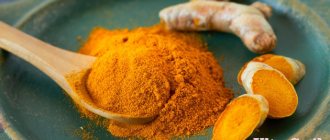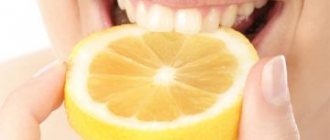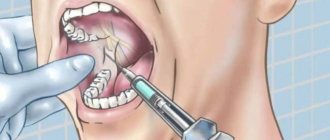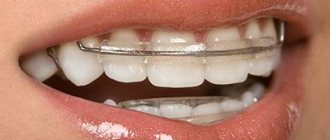Over time, tooth enamel begins to darken, losing its natural tone. Most people think about ways to whiten their teeth at home.
There are many ways to do this yourself.
One of the safe, affordable and effective remedies is tea tree oil.
General information
Melaleuca is an exclusively Australian plant. After water distillation, valuable essential oil is obtained from the juice of the leaves. It is a clear, light yellow liquid with an odor combining camphor and wood.
Containing a huge number of terpineols, it has powerful antimicrobial, anti-inflammatory, wound-healing, and soothing effects. Aborigines have used it since ancient times to cure serious illnesses, skin diseases, bites and burns.
Today its beneficial properties are used in medicine and cosmetology. It is an integral component of many cosmetics and medications.
The main use of the oil was as a teeth-lightening agent. Their tone changes when plaque is removed, which often causes the enamel to darken.
For children
Lavender and chamomile are especially useful for parents during the period when their children begin to teethe. In order to avoid allergies, you should first consult your doctor. 3 Recipe When children's teeth grow, it is recommended to use the following: mix 1 drop of lavender or chamomile with 5 ml of any essential oil of your choice. The mixture is brought to room temperature and massaged onto the cheek near the ear, where the growing tooth is located.
Chamomile oil is considered one of the best calming tools. It brings relaxation and peace on both the physical and emotional levels, perfectly relieves excitement and irritation, and allows you to quickly cope with anxiety and tension.
It is important to know that essential oils cannot be given to children in their pure form! Ordinary ones are possible, but before use, consultation with a specialist is necessary for the possible manifestation of allergic reactions, which can occur in both children and adults.
The benefits of this remedy
The oil has long been used as a remedy to eliminate redness, rashes and cracks on the skin. But few people know about its beneficial effects on the condition of the oral cavity. In addition to the whitening effect, it has a number of other properties useful for dentistry:
- Affects the condition of the mucous membrane : bleeding and increased sensitivity disappear due to a pronounced sedative effect.
- Relieves gum swelling and inflammation. It has been used for a very long time as the main remedy for combating many gum diseases. It easily fights fungi and viruses, affecting them from the inside.
- Eliminates tartar . The special composition of the product allows it to be used in the prevention of formation and getting rid of minor plaque or already hardened plaque that has turned into stone.
- Relieves bad breath . The cause of its appearance is fungi, viruses and pathogenic microorganisms present in the oral cavity. Having a strong antiviral effect, the oil suppresses their activity, providing a sanitizing effect.
- Used as a preventive and therapeutic agent against caries. The development of bacterial microflora in the mouth is the main cause of caries and enamel destruction. Its antiseptic effect eliminates pathogens and prevents their reappearance.
Regular use of oil will help keep your teeth healthy and beautiful.
Efficiency
The product does not whiten dental tissues, but returns them to their natural shade, removing plaque and hard deposits. Essential oils effectively remove impurities, prevent the spread of viruses and bacteria, strengthen gums, but you can only brighten your smile by one tone. Only professional whitening systems can globally change the color of teeth.
Dentists advise not to get carried away with procedures for a long time. It is better to purchase a special mouthwash or professional toothpaste.
Contraindications
Although it has many beneficial properties, the oil has several contraindications for use. You should avoid using it for teeth whitening in the following cases:
- if the enamel is thin, fragile or prone to thinning, its use leads to even greater thinning;
- when carrying a baby and breastfeeding, the entry of the active components of the drug into the general bloodstream can have a detrimental effect on the child’s condition;
- age up to 18 years - until this time the enamel is not strong enough, since the process of its mineralization has not yet been completed, and many chemical components of the oil can cause its destruction;
- If you are allergic to thyme and celery, you may also have a reaction to the oil. This coincidence is explained by their similar component composition.
The absence of these restrictions allows the oil to be used to lighten enamel, provided that it is of high quality and does not contain additional impurities.
We invite you to study dentist reviews of ultrasonic toothbrushes in our next publication. And here you can see photos before and after fang extensions.
What Science Says
Some people think that oil pulling is unscientific. However, today there are several scientific findings that confirm the positive effects of oil pulling. A 2021 study describes the benefits this way: “Oil pulling improves oral hygiene when practiced correctly and regularly. The limited research available on the effects of oil pulling on oral hygiene shows promising benefits.”
And although oil pulling is often called a detox procedure, scientists do not share its ability to fully rid the body of toxins. Yes, the oil removes bacteria and physical particles from the mouth, but it is not able to remove toxic particles from the bloodstream or tissues. This is done by the kidneys and liver.
An earlier study from 2009 found that the benefits of oil pulling were comparable to chlorhexidine mouth rinses: “Oil therapy showed a reduction in plaque levels, changes in gingival parameters and total aerobic colony counts.” Scientists spoke out even more specifically in favor of oil pulling in 2014: “Rinsing your mouth with sesame oil is as effective in reducing bad odor and the microbes that cause it as a chlorhexidine solution. Gargling should be promoted as a preventative home care therapy.”
Scientists from Kerala in 2015 recorded a statistically significant decrease in plaque and gingivitis levels already on the seventh day of coconut oil therapy. The study highlighted the anti-inflammatory and antimicrobial properties of lauric acid, which coconut oil is rich in. This may be why coconut oil pulling has become so popular these days.
Ready-made recipes
There are several ways to help lighten enamel by 1-2 shades with tea tree oil. Each of them has its own application features and advantages.
Cleaning
One of the simplest and most effective ways. First, use a toothpaste used every day to brush your teeth, and then rinse your mouth with warm water. Apply 2-3 drops onto a clean brush. oil and treat teeth for 2 minutes. The final stage of the procedure is rinsing.
This method is not recommended for daily use. It is enough to carry out the procedure twice a week.
This recipe is described in the following video:
Rinsing
This method is also effective, but it will not be possible to achieve the desired result quickly. It will take at least a month for the results of the procedure to be noticeable.
Rinse every day before brushing your teeth in the morning. Prepare a solution: add 3-4 drops of oil to 0.5 cups of warm water. After rinsing your mouth with this solution, it is rinsed several more times with clean water.
Important: to avoid irritation of the gastric mucosa, try not to swallow the solution while rinsing.
The lightening effect is based on the gentle effect of substances present in the oil on plaque. They soften it, and subsequent brushing removes it more effectively.
Instead of regular water, you can use mineral water (without gases!). This method is suitable for lightening the teeth of experienced smokers.
Lemon mixture
Before using this recipe, brush your teeth with paste and rinse your mouth thoroughly. Apply 2-3 drops to the brush. main product and only 1 drop. lemon oil.
The combination of these agents enhances the antiseptic effect of the mixture and allows you to quickly remove plaque. It is not recommended to use it more than 2 times within 7 days.
Aloe Vera Blend
This recipe is recommended for use on sensitive enamel. To prepare it in 1 tsp. aloe vera added 3 drops. oils
As in the previous recipe, teeth are treated twice a week after brushing them with paste for a month.
Mixture with the addition of agave
Mix 3 drops. oil with 1 tsp. Agave infusion. The prepared mixture is applied to cleaned teeth and gums. After 3 min. the mixture is thoroughly washed off with warm water. Enamel treatment is performed no more than 2 times within 7 days in a course of 1 month.
Mixture of several ingredients
3 drops oils are mixed with dry crushed banana peel, 1 tsp. olive oil and 1-2 tsp. sea salt. The resulting mixture is used to treat the teeth twice a day. The result of the procedure will be visible in a week.
Mixture with added baking soda
Mix 0.5 tsp. soda with 2 drops. oils Before treating the enamel with this mixture, it is cleaned with regular paste. After using the mixture, the mouth is thoroughly rinsed with water. The product can be used no more than 2-3 times a week for a month.
These recipes are effective in cases where the darkening of the enamel was caused by:
- food colorings found in drinks and food;
- nicotine;
- high tissue adhesiveness to plaque and tartar.
Important: the effect of the oil on the tone of the enamel is not permanent, i.e. after some time the teeth lightening procedure will have to be repeated.
Oil pulling theory
Oil pulling uses the ability of oil to attract its own kind, namely to pull other oils and fat-soluble toxins from tissues, thereby providing a cleansing effect. Bacteria that inhabit the oral cavity have a greasy outer shell. When they come into contact with another fatty substance, such as oil, they stick or are attracted to it.
Since the oil has the ability to penetrate into hard-to-reach areas of the mouth where a toothbrush cannot reach, it can trap hidden bacteria.
This amazing property of oils has been used for centuries in classical Ayurvedic detox practices. The ancient Indian system of medicine includes the concept of ama, which refers to accumulated toxins and various impurities in the body. Ama is believed to be partially digested material derived from food that clogs the body and causes an immune reaction. It is precisely to reduce this ballast that oil rinsing is aimed.
According to Ayurveda, the tongue is associated with various organs such as the kidneys, heart, lungs, small intestine and spine. Oil pulling is believed to help in eliminating toxic heavy metals through saliva. Oil pulling activates salivary enzymes that absorb toxins and remove them from the body through the tongue.
Here is what the canonical book of Ayurveda, Charaka Samhita, says: “The practice of oil pulling provides strength in the jaw and voice, facial development, maximum taste and pleasure in food. A person who practices it does not suffer from a dry throat, is not afraid of cracked lips, and his teeth are not affected by caries, but become strong. They (teeth) are not painful, are not hypersensitive to sour taste, but gain the ability to chew even the hardest food.”
Advantages
Despite the fact that it is possible to lighten enamel faster and more effectively by other means, oil has a number of advantages:
- natural lightening composition;
- does not injure and has a gentle effect on soft tissues and enamel due to the absence of mechanical influence on them;
- can be used even for stomatitis, periodontitis, gingivitis;
- does not cause irritation to the mucous membrane, but promotes its nutrition and healing in case of existing diseases;
- availability of lightening at home with minimal investment of time and money;
- ease of implementation;
- no side effects.
All of the listed advantages of the product make it one of the most common and popular.
Tips for use
Changing the tone of teeth with tea tree oil is a safe and simple procedure. But even when doing this, you must adhere to several recommendations:
- Strictly adhere to the recipe: observe the dosage of all components. Do not use oil more often or for longer than indicated in the recipe.
- Use only natural (without additives) oil. Its cost will be slightly higher, but when compared with other whitening means, it will remain low.
- As a preventative measure, bleaching is performed twice every 10 days. If an additional medicinal purpose is pursued, then the oil can be used daily for a month.
- During the entire course of using the product, you should not drink drinks containing dyes. The following are prohibited: strong tea, cocoa, chocolate, coffee, wine, juices.
- It is also necessary to exclude dishes that contain foods with coloring substances, for example, carrots, beets.
- The result of lightening will be negatively affected by the consumption of cold (hot) foods during this period.
- At the end of each procedure, you should rinse your mouth with water at room temperature. This action helps relieve numbness and remove any remaining product.
- During the entire course, it is important to ensure the supply of vitamins and microelements to the body, for example, through the presence of fruits and vegetables in the diet.
- It is not recommended to eat within an hour after completion of the procedure.
- For smokers: limit the number of cigarettes you smoke or quit them completely.
- After the first use of the oil, numbness of the lips, tongue, or an unpleasant taste may occur (these reactions are considered normal).
We invite you to read reviews about laser teeth whitening and also learn more about this procedure. By clicking on the following link: https://dentist-pro.ru/krasota-i-uxod/sredstva/zubnye-pasty/obzor-splat.html - you can find a description of the Splat Ultracomplex paste.
And in this article we will talk about the features of teeth whitening at home with hydrogen peroxide.
Tea tree oil is suitable for most people and will help lighten enamel if you follow these guidelines.
Can tooth decay be cured with coconut oil?
It is important to understand that coconut oil is effective for preventive purposes; oil does not treat existing caries. In this case, a dentist will help you. At the first appointment, he will determine at what stage the caries is. If it is just a white spot on the enamel (early stage), the treatment will be as simple and non-invasive as possible. The doctor will perform remineralization, fluoridation, or seal the enamel pores using the infiltration method. All these procedures are painless and are carried out without deep intervention in the tooth structure. If the caries has penetrated deeper, a carious cavity has formed in the tooth, in this case anesthesia, tooth preparation with a drill and filling will be required.
After treatment, to prevent recurrent caries, you can rinse your mouth with coconut oil or choose another rinse on the advice of your dentist.
Sources:
- pubmed.ncbi.nlm.nih.gov
- stomatologclub.ru
- ria.ru
- smile-59.ru
Dentist reviews
Dentists always welcome actions taken by patients aimed at maintaining the health of their teeth and their appearance. But they do not always approve of the methods used to achieve the desired result.
If you study the reviews of experts about tea tree oil as a means for lightening enamel, then most of them approve of it.
The main recommendation before starting to use it is to undergo examination by a specialist and identify contraindications to its use. The oil is recommended for lightening enamel, subject to strict adherence to the course of application and dosage.
Important: frequent and uncontrolled use inevitably leads to the development of pathologies of the gums and teeth.
Why I Don't Recommend Using Fluoride Toothpaste
Fluoride was added to the water supply and toothpaste. For years, dentists have offered it to treat and prevent tooth decay. However, fluoride has come under scrutiny in recent years. And for good reason.
One groundbreaking study showed that the fluorapatite layer on teeth after using fluoride toothpaste was only 6 nanometers thick.
For comparison: to obtain the width corresponding to the width of one hair, 10,000 such layers are needed.
Researchers are now wondering whether such an ultra-thin layer can actually protect tooth enamel, given the fact that ordinary chewing quickly removes the fluorapatite layer from teeth.
Other toothpaste ingredients are more effective at repairing and remineralizing dentin (the tissue underneath the enamel that is the bulk of the tooth) than fluoride toothpaste.
Fluoride toothpaste may also be where children get the most fluoride, which is a major risk factor for dental fluorosis. Studies have shown that it is not uncommon for young children to swallow amounts of toothpaste that contain more fluoride than the recommended amount that can be obtained throughout the day from all sources.
Science has clearly demonstrated that swallowing fluoride is harmful to your health and the health of your baby. Fluoride is a toxic chemical that accumulates in body tissue over time and negatively affects enzymes, severely impairing neurological and endocrine function.
Children are especially sensitive to the negative effects of excessive fluoride intake. Therefore, if you have small children, I recommend not using fluoride toothpaste or teaching them to brush their teeth with coconut oil.
Fluoride accumulates in your and your baby's body, so it would be a good idea for you to also use fluoride-free toothpaste.










